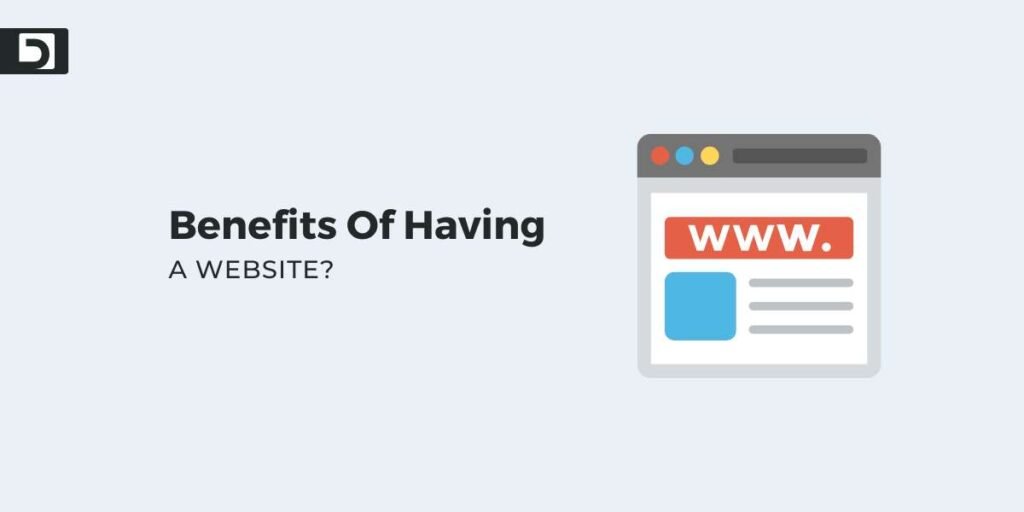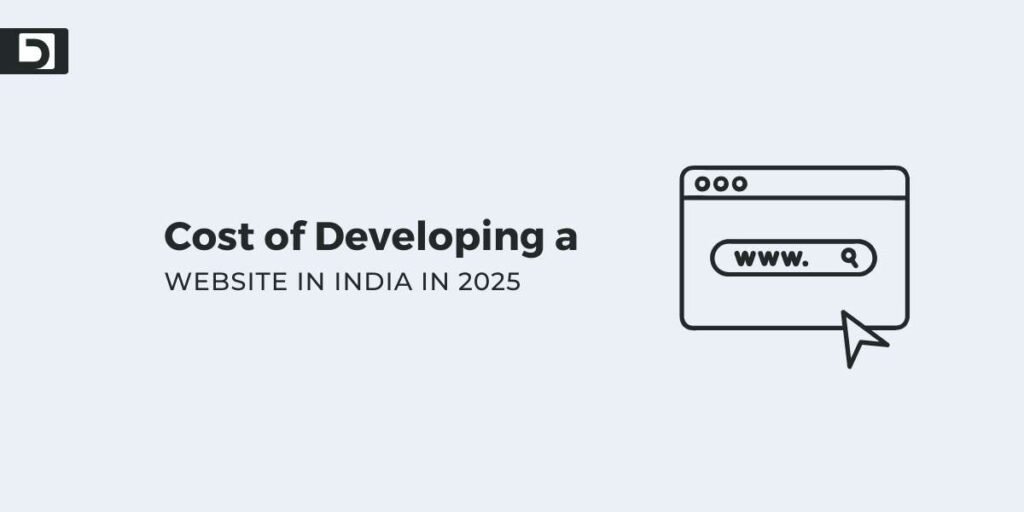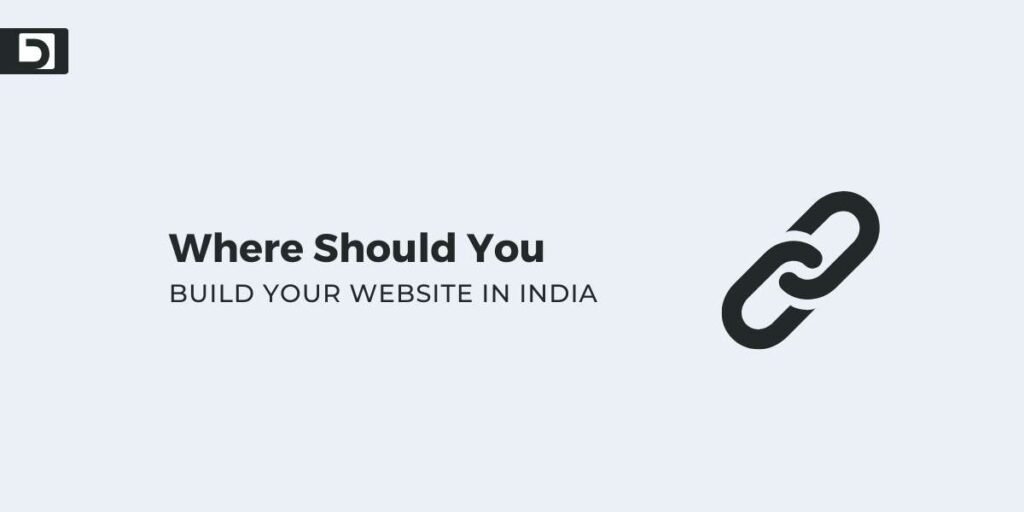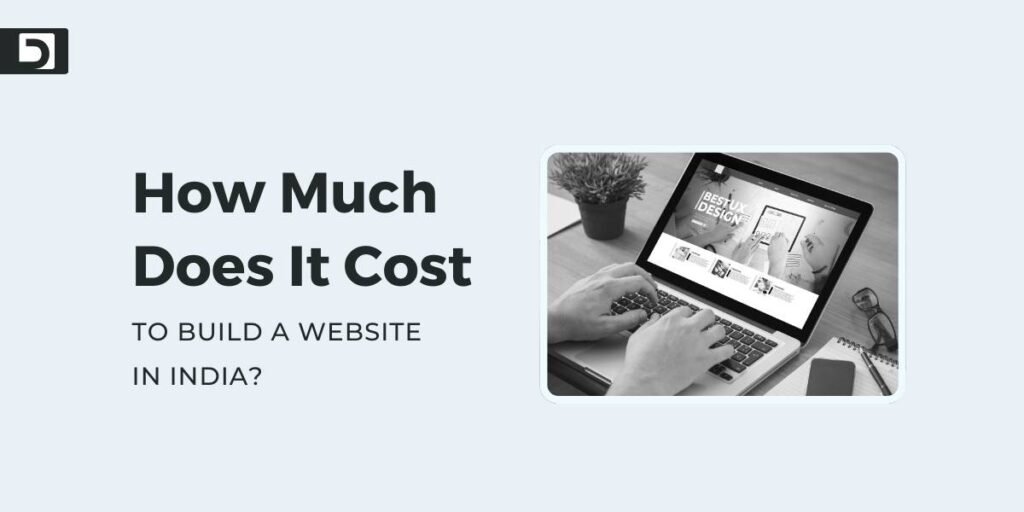In India more than 900 million users are on the internet, which makes businesses to adopt digitalization and use internet marketing channels to grow more sales.
For growing a business in India it’s required to have a professionally designed website to reach potential customers.
Why Do We Need A Website For Your Business?
Website is not just a web page or a virtual address. It serves as a main tool for businesses to grow online in today’s digital space.
A well designed professional website builds trust and credibility amongst the potential customers and helps them to make a purchase decision.
For example – A local boutique with a professionally designed website and an online catalog that appears in search results looks more credible and professional compared to one without a digital presence.
Websites also help to showcase your services or products and with the right strategic SEO and use of digital marketing businesses can reach national to global markets.
As You Come To Search To Know What Is The Cost To Build A Website In India In 2025?
So, here we have created a detailed blog post for everything you need to build a professional website in India and how much does it cost to build it and from where you should try to build a website for your business.
At Digital Braino, we have helped more than 50+ businesses to develop a website.
As we have hands-on experience of building websites for all kinds of businesses, we can surely help you to find best pricing and places to build a website for your business in India.

Benefits Of Having A Website?
Having a website is essential for any business, big or small. It offers many benefits that help your business grow, reach more customers, and improve its online presence.
Here Are The Key Benefits Of Having A Website:
1. Build Credibility and Trust
A professional website makes your business look credible and trustworthy. It helps customers learn more about your services or products and provides contact details and makes them feel confident in choosing your business.
2. Increase Visibility
A well optimised website makes it easier for people to find your business online. With good search engine optimization (SEO), your website can appear higher in search results, helping you attract more visitors and potential customers.
3. Reach a Larger Audience
Having a website allows your business to reach customers beyond your local area. Whether you’re a small business or a large company, a website helps you target national or even international audiences.
4. Available 24/7
Unlike physical stores with set hours, your website is always available. Customers can visit your site, explore your products, and make purchases any time of day or night, even when your store is closed.
5. Drive Sales and Leads
With a website, you can sell products directly through e-commerce features or generate leads with contact forms. Optimized pages and clear calls-to-action encourage visitors to become paying customers.
6. Improve Customer Engagement
Websites with interactive features like live chat, FAQs, and contact forms make it easy for customers to get in touch. Engaging content like blogs or newsletters keeps customers connected and informed.
7. Cost-Effective Marketing
A website is an affordable way to promote your business compared to traditional ads. By using blogs, product pages, and online promotions, you can reach more people with less investment.
8. Build Your Brand
Your website reflects your business’s identity. The design, colors, and messaging help create a strong brand presence that resonates with your target audience and sets you apart from competitors.
9. Access Analytics and Insights
With tools like Google Analytics, you can track website visitors, understand their behavior, and measure how well your website is performing. These insights help you improve your website and marketing strategies.
10. Stay Competitive
In today’s digital world, businesses without a website may lose customers to competitors who have an online presence. A website helps you stay competitive and grow your business.

Cost of Developing a Website in India in 2025
Creating a website in India is cost effective for establishing an online presence. The website cost depend on the functionalities, features, complexity and
Building a website in India is a cost-effective way to establish an online presence. The total cost depends on factors like the type of website, features, complexity, and the professionals you hire. In this guide, we’ll break down the costs associated with creating a website in India to help you plan your budget effectively.
1. Choosing the Right Website Type for Your Business
Websites are essential for individuals, businesses, and organizations in today’s digital age. Depending on your purpose and goals, there are various types of websites you can build. Let’s dive into the most common and popular website types.
- Basic Website
- Business Website
- E-commerce Website
- Custom Website
A. Basic Static Websites
Static websites are simple, cost-effective, and ideal for small businesses or personal portfolios. They usually consist of a few fixed pages like Home, About Us, Services, and Contact. Since they don’t require frequent updates, they are cheaper to develop and maintain.
| Features | Simple design, basic content, contact form |
| Cost | ₹5,000–₹20,000 |
| Examples | Small business websites, personal portfolios |
B. Business Websites
Business websites provide essential information about a company, including services, contact details, and client testimonials. These websites often include additional features like blog sections, inquiry forms, and basic SEO optimization.
| Features | Multiple pages, blog section, contact forms, SEO-friendly structure |
| Cost | ₹20,000–₹60,000 |
| Examples | Corporate websites, service-based business websites |
C. E-commerce Websites
E-commerce websites enable businesses to sell products or services online. They require advanced features such as product catalogs, shopping carts, secure payment gateways, and customer accounts. The cost varies depending on the platform (Shopify, WooCommerce, Magento) and customization needs.
| Features | Product pages, cart & checkout, secure payments, customer accounts |
| Cost | ₹50,000–₹2,50,000+ |
| Examples | Online retail stores, multi-vendor marketplaces |
D. Custom Websites
Custom websites are tailored to specific business needs, offering unique functionalities beyond standard templates. These can include membership portals, online booking systems, and web applications. Custom websites require advanced development, making them more expensive.
| Features | Tailor-made designs, advanced coding, API integrations, scalability |
| Cost | ₹1,00,000–₹5,00,000+ |
| Examples | Social networking sites, SaaS platforms, on-demand service websites |
The final cost depends on additional factors like domain registration, hosting, security features, and maintenance. Choosing the right website type based on business goals and budget is essential for long-term success.
2. Factors Affecting Website Development Costs
Website development costs depend on multiple factors, from the domain name and hosting to the complexity of design and functionality. Sometimes costs are higher if you look for premium functions for your website. Here’s a breakdown of each factor:
- Domain Name & Hosting
- Website Design & UI/UX
- Development Platform
- Features & Functionality
- Maintenance & Updates
A. Domain Name & Hosting
The cost varies based on the domain extension (.com, .in, etc.) and the type of hosting (shared, VPS, dedicated) you choose for your website’s performance and security.
| Domain Name | This is your website’s name or an address (e.g., www.yourwebsite.com). Domain prices vary based on extensions: |
| .in / .com: | ₹500–₹1,500 per year |
| Premium Domains | ₹5,000–₹50,000+ (Short, brandable names like “digitalmarketing.com” are expensive.) |
| Hosting | This is where your website files and data are stored. Different hosting options are available in India: |
| Shared Hosting (Basic Websites) | ₹2,000–₹10,000 per year |
| VPS Hosting (Faster & Secure) | ₹5,000–₹50,000 per year |
| Dedicated Server (For Large Websites) | ₹1,00,000+ per year |
| Cloud Hosting (Scalable & Reliable) | ₹10,000–₹1,00,000 per year (Google Cloud, AWS, DigitalOcean) |
B. Website Design & UI/UX
A well-designed website with a user-friendly interface improves engagement; custom designs and animations can increase costs.
| Basic Templates | Ready-made designs for WordPress, Wix, or Shopify cost ₹5,000–₹20,000. |
| Custom Design (UI/UX) | A unique, brand-specific design with advanced animations, custom layouts, and interactive elements costs ₹30,000–₹2,00,000+. |
C. Development Platform
Whether you choose WordPress, Shopify, or custom coding, the platform impacts development time, cost, and scalability.
| WordPress (Easy & Affordable) | ₹10,000–₹50,000 for a business site. |
| Custom Code (HTML, PHP, React, Laravel, etc.) | ₹50,000–₹3,00,000 for dynamic websites. |
| E-commerce Platforms (Shopify, WooCommerce, Magento) | ₹50,000–₹2,50,000+ based on features. |
D. Features & Functionality
Advanced features like e-commerce, payment gateways, chatbots, and integrations add to development complexity and cost.
| Basic Website | ₹10,000–₹50,000 (Static pages, contact form, basic content). |
| Dynamic Website | ₹50,000–₹2,00,000 (User logins, CMS, payment gateways). |
| Advanced Features | ₹1,00,000+ (AI automation, APIs, real-time databases). |
E. Maintenance & Updates
Regular updates, security patches, and content management ensure smooth performance but require ongoing investment.
| Basic Maintenance | ₹5,000–₹20,000 per year (updates, security, backups). |
| Advanced Maintenance | ₹20,000–₹50,000 per year (new features, redesigns). |
3. Additional Costs
When building and maintaining a website, there are various costs beyond just the initial development. These additional expenses can significantly impact the overall budget.
A. SEO & Digital Marketing
To drive traffic and improve online visibility, businesses need SEO and digital marketing strategies. Basic SEO setups are cost-effective, while advanced digital marketing requires ongoing investment.
| Basic SEO Setup | ₹5,000–₹20,000 (Keyword optimization, meta tags, basic backlinks). |
| Advanced SEO & Digital Marketing: | ₹10,000–₹50,000 per month (Content marketing, paid ads, social media). |
B. Content Writing
Quality content enhances user engagement and boosts SEO rankings. Website content and blog writing, particularly when optimized for SEO, are essential for attracting and retaining visitors.
| Basic Website Content | ₹500–₹5,000 per page. |
| Blog Writing (SEO-Optimized) | ₹1,000–₹10,000 per blog. |
C. Security & SSL Certificates
Secure websites ensure safe transactions and protect user data. Basic SSL certificates offer basic encryption, while advanced security measures provide stronger protection and threat prevention.
| Basic SSL Certificate | ₹500–₹5,000 per year. |
| Advanced Security (Firewalls, Malware Protection) | ₹5,000–₹20,000 per year. |
D. Third-Party Integrations
Integrating third-party tools like payment gateways and CRM systems can streamline business operations. These integrations vary in complexity and cost depending on the service or software.
| Payment Gateways (Razorpay, PayU, Stripe) | ₹5,000–₹50,000 depending on complexity. |
| CRM & Automation Tools | ₹10,000–₹1,00,000+ depending on software (HubSpot, Zoho, Salesforce). |
E. Mobile Optimization & Speed Enhancements
Optimizing for mobile devices and enhancing website speed are key to a smooth user experience. Mobile optimization ensures accessibility, while speed enhancements improve site performance and retention.
| Basic Mobile Optimization | ₹5,000–₹20,000. |
| Advanced Speed Optimization (CDN, Caching, Image Compression) | ₹10,000–₹50,000. |

Where Should You Build Your Website in India in 2025?
You might be wondering, after understanding the basics of website development costs, where you should build your website. There are multiple options available, and choosing the right one depends on your needs, budget, and technical skills. In this section, we will break down each option to help you decide which is the best choice for you.
- Freelancers
- Web Development Agencies
- Website Builders
- CMS-Based Websites
- Custom-Coded Websites
1. Freelancers
If you don’t have a big budget, hiring a freelancer is the best option for you. They can provide the website you need for your business within your budget. You can find freelancers through a direct Google search or on freelance marketplaces like Upwork, Fiverr, and Freelancer.com.
| Pros | ✅ Affordable compared to agencies ✅ Customizable designs and features ✅ More flexibility and direct communication |
| Cons | ❌ Quality and reliability vary ❌ May not provide long-term support ❌ Takes time to find the right freelancer |
| Best For | Small businesses, personal websites, startups with a limited budget |
| Cost | ₹10,000–₹1,50,000 |
2. Web Development Agencies
If you have a budget to build a website for your business, a web design company in India can help you create a professional website. A good web development company offers quality design, development, SEO, and maintenance services.
| Pros | ✅ High-quality and professional design ✅ End-to-end development, including SEO and security ✅ Ongoing maintenance and support |
| Cons | ❌ More expensive than freelancers or website builders ❌ Requires communication and approvals, which may slow the process |
| Best For | Medium to large businesses, startups that need a scalable website |
| Cost | ₹30,000–₹5,00,000+ |
3. Website Builders
Website builders like Wix, Squarespace, and Weebly allow users to create a website using pre-designed templates and drag-and-drop features, But the cost of the website depends on the features and services you are using.
| Pros | ✅ Easy to use, no coding required ✅ Affordable monthly pricing ✅ Quick setup with hosting and security included |
| Cons | ❌ Limited customization and flexibility ❌ Not ideal for large businesses or unique features |
| Best For | Beginners, small business owners, and personal websites |
| Cost | ₹2,000–₹5,000/month |
4. CMS-Based Websites
A CMS website is a good option, and nowadays, most people use WordPress for website development due to its user-friendly CMS platform. Other Content Management System (CMS) platforms like Joomla and Drupal also offer flexible solutions for website creation.
| Pros | ✅ Highly customizable with thousands of themes and plugins ✅ SEO-friendly for better search rankings ✅ Suitable for businesses, blogs, and eCommerce |
| Cons | ❌ Requires some technical knowledge ❌ Needs regular updates and security management |
| Best For | Businesses, bloggers, eCommerce stores, and startups looking for scalability |
| Cost | ₹5,000–₹50,000+ (depending on hosting, themes, and plugins) |
5. Custom-Coded Websites
Custom-coded websites are quite expensive. To build a custom-coded website, you need a highly professional team or experts. A fully custom-coded website can be developed from scratch using HTML, CSS, JavaScript, and backend technologies like PHP or Python.
| Pros | ✅ Complete control over design, features, and performance ✅ Highly secure and scalable ✅ No limitations of third-party platforms |
| Cons | ❌ Expensive and time-consuming ❌ Requires experienced developers for maintenance |
| Best For | Large enterprises, SaaS businesses, and companies needing unique features |
| Cost | ₹50,000–₹5,00,000+ |
Emerging Trends in Website Development (2025)
- AI-Powered Chatbots
Websites are integrating AI chatbots to enhance customer interactions. They provide 24/7 support and can handle FAQs or leads seamlessly. - No-Code and Low-Code Solutions
Platforms like Wix and Webflow are becoming popular for fast and budget-friendly website creation without technical expertise. - Headless CMS
Headless CMS solutions like Strapi or Contentful allow developers to deliver content to multiple devices and platforms seamlessly. - Voice Search Optimization
With the rise of voice assistants, websites optimized for voice search queries are seeing improved traffic and user engagement. - Progressive Web Apps (PWAs)
PWAs merge the best of mobile apps and websites, offering faster load times and offline capabilities, making them ideal for e-commerce. - Sustainability-Focused Design
Green hosting services and lightweight websites aim to reduce the carbon footprint of web development. - Hyper-Personalization
Websites now use AI and data analytics to deliver personalized experiences, tailoring content based on user preferences.
Final Thoughts
The cost of building a website in India in 2025 depends on your requirements, features, and service provider. For startups and small businesses, a WordPress site or website builder can be a budget-friendly option. However, for scalable and highly functional websites, investing in professional development is advisable.
If you need expert assistance, get in touch with a professional web development agency in India to discuss your project and budget.
